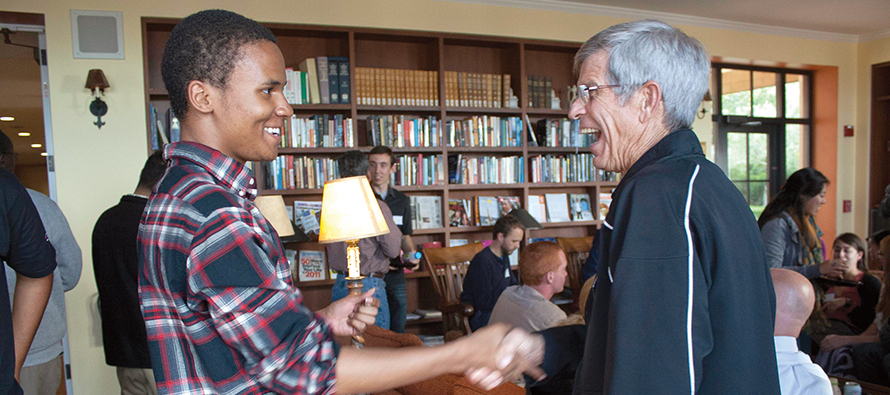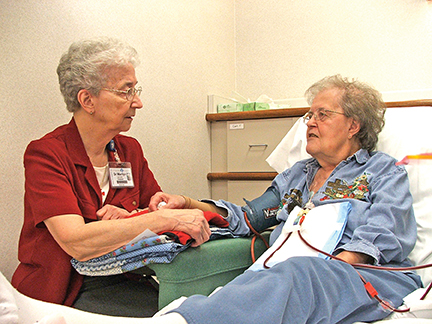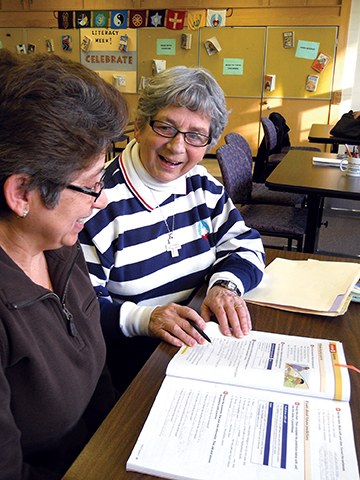Heaping helpings of mercy

Image: Education is among the spiritual works of mercy, and religious orders have long served in the field of Catholic education. Lionell Daggs III greets Jesuit Father Stephen Privet, S.J. at an event at the University of San Francisco.
Quite a few of us have noble intentions. Hooray for this! We may have altruistic ideals and deeply felt convictions. A few of us may even harbor a grand plan about how to achieve justice on this planet. All of this is nice to hear! But you want to know the truth? The contents of my heart and yours are of no practical use to anyone. It’s what actually emerges from the heart, and where it takes us, that counts.
It catches our attention that, in this Holy Jubilee Year of Mercy, Pope Francis never wastes words on the global need for kinder ideas. Compassion isn’t a matter of soft feelings that stir at the sight of human suffering. Rather, it involves active responses to the world’s brokenness. So, when it comes to answering the pain of humanity, give us the works—the works of mercy, that is.
Mercy has deep roots
The business of doing mercy isn’t left open to wishy-washy interpretation in our tradition. As with many things Catholic, it’s been honed to an official list with firm roots in biblical teaching. On that list are seven corporal (bodily) and seven spiritual (but no less tangible) works. Who put this list of 14 deeds together in its final form? No one knows, although by the 13th century, Thomas Aquinas was quite familiar with such a list, which he termed “alms deeds.” The word alms is a corruption of the Greek word for mercy. When we give alms, we give mercy in practical forms.

The corporal works won’t surprise anyone who’s read Matthew’s final judgment scenario, in which moral winners and losers are separated based on their response to Jesus in the guise of the poor. Feed the hungry. Give drink to the thirsty. Clothe the naked. Protect strangers. Visit the sick. Visit the imprisoned. Bury the dead. (OK, Matthew doesn’t say anything about burying the dead. That seventh work comes from Jewish tradition, emphasized in the Book of Tobit.) Jesus himself samples his favorite prophet, Isaiah, in delineating the six actions that make moral victors in the judgment story.
Conscientious practice of the corporal works of mercy could literally change the world. Redistributing resources and technological know-how from the First World to developing cultures is one obvious way to deliver a lot of mercy at once. We should definitely do this—each according to our means. We can also think more broadly, and locally. People we know are hungry for more than food, thirsty for more than water. We meet folks clothed in shame, to whom we might offer the mantle of human dignity in how we treat them. We can be more vocal in our support of strangers who are migrant workers, or for social policies affecting refugee admissions to this country.
Our friends may be sick with grief, diminished by depression, or discouraged in unemployment. Elder relatives may feel imprisoned as they become increasingly housebound or confined to assisted living. Participating in bereavement meals of hospitality after parish funerals, or sending a handwritten note or Mass card to those shouldering loss are other ways to accept the communal responsibility to bury the dead.
Creative ways of interpreting the works of mercy are always welcome. Take the sixth corporal work, for example. In the 12th century, two religious orders were founded to provide a fresh response to visiting the imprisoned. Both the Trinitarians and the Order of Our Lady of Ransom dedicated themselves to those captured in warfare. The latter group did more than visit those prisoners: They took a fourth vow to redeem prisoners by offering themselves in exchange. In more recent times, 20th-century laywoman Mary Clarke Brenner started the Eudist Servants of the Eleventh Hour for mature women (between 45-65) willing to dedicate themselves to ministry in a maximum security prison. Brenner herself, as Mother Antonia, spent the last 30 years of her life voluntarily incarcerated with the men she served. Today, the Eudists continue their prison ministry, as well as visiting the homebound and those in nursing homes.

Mercy has a body and spirit
When it comes to deeds of mercy, most of us lean into the corporal works at once. Who’s not in favor of feeding, clothing, housing, and caring for needy people? The spiritual works of mercy can seem second-tier considerations by comparison. But in our materially rich, spiritually impoverished society, these latter works are more vital than ever. The list may sound a bit severe to the modern ear: Admonish the sinner. Instruct the ignorant. Advise the doubtful. Comfort the afflicted. Bear wrongs patiently. Forgive injuries. Pray for the living and the dead. Some lists swap out “correct” for “admonish,” which sounds too much like being yelled at. And nobody likes being called ignorant, even when they’re honestly innocent of information that might help them.
Frankly, once in a while we all need someone to tell us the truth about ourselves. Our egos perform to tell us precisely what we want to hear, and an exterior corrective (admonishment) is just the thing to challenge us and set us straight. We all could use one family member or friend who has the right to tell us where to get off when we’re out of bounds. If no one in our lives is imbued with that privilege, maybe we’re protecting ourselves with an entourage.
While ignorance is a state no one wants to cop to, there’s clearly more to reality than any of us can hope to know. With all the sources available to access information, there’s still no app for understanding. We can’t Google our way out of ethical ineptitude the way we acquire Wiki-facts to settle debates. It’s an exercise in humility to acknowledge our limits and accept the guidance of someone whose experience is larger or deeper. It’s also a great kindness for a wise person to tell us in a timely way how to rescue ourselves from being the dense bricks we’re all perfectly capable of resembling now and again.
Advice for the doubtful? Sure, this work includes spiritual direction for those who flirt with agnosticism—but doubt covers a lot more territory than that. The present age is wonderfully ironic in its take on human behaviors. Yet that same tendency to view issues ironically betrays a skepticism that runs bone-deep in our culture. We don’t trust much. We doubt the possibility of goodness in people, or authority in institutions, or right answers, or anything but the most relative and watered-down versions of truth. How do we plot a moral path when “it’s all good,” or when everyone gets to make a selfie out of moral standards? This kind of doubt—that any choice is as good as another—has a growing fan club.
Corporal works: Isaiah 58:6-10; Matthew 25:31-46; Tobit 1:16-20
Spiritual works: Matthew 18:15-16; 18:21-35; 1 Thessalonians 4:13-18; 5:12-13; 1 Timothy 4:6-16; 2 Timothy 4:1-5; John 11:19; 20:26-29; James 5:7-11; 5:16; Colossians 3:12-13; 2 Maccabees 12:38-46
Bring mercy to modern masses
Can we make creative responses to the spiritual works in this generation? There may be perhaps too many takers for correcting sinners today, and too few willing to forgive injuries. Instructing the ignorant was once popular: Countless communities of religious women came to this country to teach immigrant children (and their parents through backdoor catechesis). Women and men religious remain a significant source of spiritual encouragement and guidance in retreat ministries, chaplaincy, social services, and personal counseling.
My personal goal in this year of mercy has been to wade into religious instruction with the children at my parish. I’m not really trained for this work. But the sea of need these kids face—impoverished by many amusements and too few clear values—breaks my heart each Sunday morning when we gather. They don’t hear much about God elsewhere, don’t know why we go to church, what’s in the Bible, or what life is for. But at least once every week, some kid asks the right question, or has an “aha” experience. A door to understanding swings open. Take that, ignorance!
Related article: vocationnetwork.org, “What exactly is a ‘Jubilee Year’? What’s a ‘Holy Year’?”, Vision 2016.
Tags
Related
- Questions Catholics Ask
- What Catholics believe about the Eucharist
- How Jesus embraced his call
- Prayer: Our never-ending conversation with God
- What the church is teaching—and learning—about the sin of racism
- Church defined: Jesus calls; we respond
- A Creed to believe in
- On whose authority?
- Ten great things about being Catholic
- Following Jesus: Be ready for some surprises Read More
Most Viewed
- Find your spirituality type quiz
- Questions and answers about religious vocations
- Celibacy quiz: Could I be a nun? Could I be a brother? Could I be a priest?
- Resources for older discerners or those with physical and developmental differences
- About Vocation Network and VISION Guide


